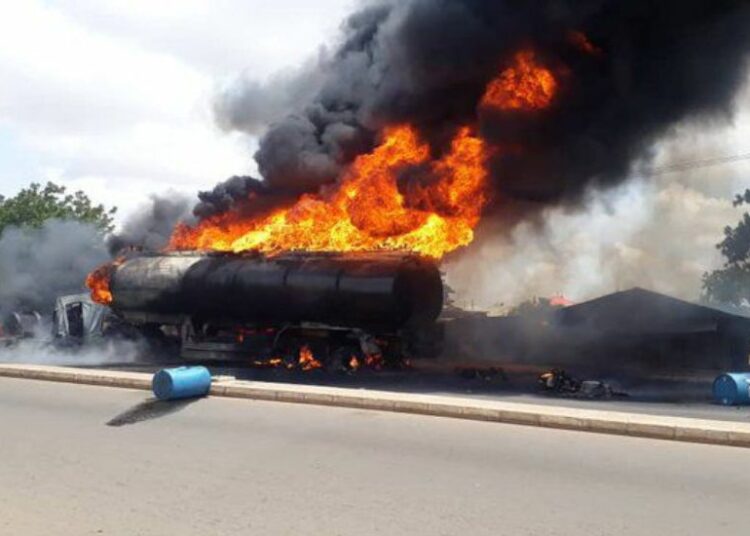In Majiya, Taura local government area of Jigawa State, virtually every family has a tale of woes to tell about last Tuesday’s tanker explosion which claimed several lives.
From the accounts of parents who lost their children and students whose colleagues were burnt alive in the tragedy, 70 per cent of the victims were youths.
A father, Malam Isa Mainingi, lost three of his children in the tragedy.
In an interview with LEADERSHIP Weekend, Mainingi said he had been forced to accept that his three children were among those in the mass grave since his search for them after the incident had proved abortive.
He said, “I can’t say anything except to pray to Almighty Allah to give their souls eternal rest in the Jannatul Firdausi.”
A more chilling account came from an eyewitness and Senior Secondary School (SSS2) student of Government Day Senior Secondary School, Amiru Ismail Majiya.
He said, “I watched helplessly from a distance as three of my school mates were burnt into ashes in the tanker explosion accident.”
Majiya estimated that he was about 40 metres away when the first explosion occurred, which was followed by the second from the petroleum tanker.
“The tanker fell at about 11:30am on that fateful day and knowing the danger associated with it, security personnel immediately condoned off the place and prevented the residents from coming close to the scene.
“Unfortunately, the content of the tanker spilled through a gutter to another point where the residents began to scoop it. The security men attempted to disperse them but they resisted.
“To me, the current economic hardship was the major contributory factor. It made people to defy the security men’s warning and moved ahead to scoop the spilled fuel in the gutter.
“I saw a mobile policeman Kasim Habu, an indigene of Majiya, who was on leave from his station. Habu warned the people of the danger of their actions. Unfortunately, before he left the place, the explosion occurred and he died.
“Three of my classmates were affected by the inferno. They were Sani Umar, 17, Yusif Haruna and Saidu Haladu,” he said.
Mijiya claimed that many students died in the accident, adding that about 90 percent of the victims were youths.
Another parent, Malama Rabi Salisu, lost her 22-year-old son, Ibrahim Salisu in the incident.
She said when the accident occurred, the whole town was thrown into confusion as parents were looking for their children and loved ones.
“I joined in searching for my child, Ibrahim, but I could not find him that night, though I still had hope that he was alive, apparently hiding somewhere for safety.
“The following morning (Wednesday), we kept searching for him with the hope of finding him alive but after the mass burial of the 109 victims, my hope was dashed. We have concluded that he was among those given mass burial,” Rabi stated, sobbing.
Another eyewitness, Ibrahim Shehu said when the tanker fell, its content spilled into the gutter and the residents started scooping it with different containers.
He claimed that in the process, there was a spark, which spread to the tanker and it exploded within seconds.
Shehu said, “The fire did not start from the tanker; it started from the gutter where the people gathered to scoop the fuel.
“The police and civil defence corps tried to stop them but they were overpowered, and see what has happened,” he lamented.
Also, Mustapha Shehu said he lost his 25-year-old brother in the inferno.
According to him, every family in the town virtually lost at least one of their loved ones, adding that “this is the worst catastrophe we ever had in the history of Majiya town.
“Everybody in this town is in a mourning mood; we have nothing to say than Inalillahi Wanna Ilaihi rajuun,” he said.
For Mustapha Abdusalam Majiya who could not control his tears, he lost over 50 of his brothers and relatives.
He said, “We have a large extended family in Majiya. At present, we have counted over 50 people that we lost in the tragedy from sons to grandsons of our family.”
The bodies of the victims were burnt beyond recognition and families which could not find their missing relations have concluded that they were dead after a 20-hour search without positive result.
As the Majiya community continues to count its loss of young men and children, data from the State Emergency Management Agency yesterday indicated that the death toll had risen to 174.
In the hospitals visited by our correspondent, officials said 75 survivors were under intensive care units (ICUs) and could only be accessed by medical personnel on duty and some personnel on special duties.
Most of the survivors of the accident suffered over 70 per cent burns and are receiving treatment in five hospitals in the state.
The deputy head of clinical services at Federal Medical Centre (FMC), Nguru, Dr Akinwumi Ademola, described the situation as very critical to manage.
He said the available doctors spent over 12 hours treating the casualties, adding that the extent of burns was severe, with most patients suffering over 70 per cent burns.
“Despite the challenges, the medical teams have remained committed to rescuing the lives of the victims as additional resources are mobilised to cope with the situation,” Ademola said.
When he received Kano State Governor Abba Yusuf at the Dutse Government House, Jigawa State governor, Malam Umar Namadi said, the explosion was the worst tragedy in the history of the state.
He explained that as the number of the dead continued to rise, it was terrifying to note that over 90 per cent of the victims were youths.
In his remarks after visiting the scene, the head of the federal government delegation, Senator George Akume said, President Bola Tinubu has pledged that necessary measures would be taken to prevent such occurrences.






